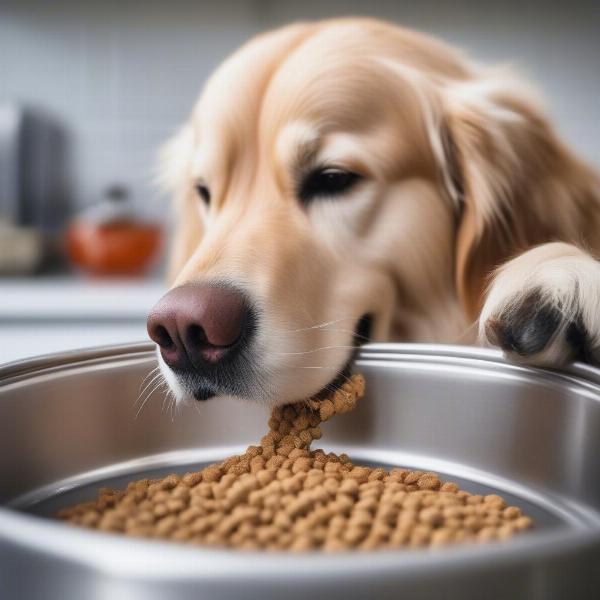Choosing the right food for your senior dog can feel overwhelming. With so many options available, how do you know which one is truly best for your aging companion? This article will guide you through selecting the best rated dog food for senior dogs, considering factors like breed, health conditions, and budget. We’ll explore what nutrients are crucial for older dogs and highlight some of the top-rated brands to help you make an informed decision.
 Senior dog eating from a bowl
Senior dog eating from a bowl
As dogs age, their nutritional needs change. They may become less active, requiring fewer calories to maintain a healthy weight. At the same time, they need specific nutrients to support joint health, cognitive function, and a strong immune system. Look for foods that are lower in calories but higher in protein and fiber to help your senior dog stay fit and satisfied.
Key Nutrients for Senior Dogs
Senior dog food should include ingredients that address the common health concerns of older dogs. Glucosamine and chondroitin are essential for maintaining healthy joints and cartilage. Antioxidants, like vitamin E and C, help protect against cell damage and support the immune system. Omega-3 fatty acids can reduce inflammation and improve cognitive function.
Understanding Protein in Senior Dog Diets
While senior dogs may need fewer calories, their protein requirements often increase. Protein helps maintain muscle mass, which can decline with age. Look for dog foods with high-quality, easily digestible protein sources.
Top-Rated Senior Dog Food Brands
Many excellent senior dog food brands cater to various needs and budgets. Some popular choices include brands like Purina Pro Plan, Hill’s Science Diet, and Royal Canin. These brands offer formulas specifically designed for senior dogs, with varying levels of protein, fiber, and joint support supplements. Always check the ingredient list and guaranteed analysis to ensure the food meets your dog’s specific requirements.
Choosing the Right Food for Your Dog’s Breed
While general senior dog food guidelines are helpful, breed-specific needs should be considered. Larger breeds may require different joint support than smaller breeds. Some breeds are prone to specific health issues, which may influence your food choice. plaque off powder dogs can be beneficial for senior dogs.
Recognizing Signs of Food Intolerance
As dogs age, they may develop food intolerances. Be mindful of changes in your dog’s appetite, digestion, or skin and coat. If you notice any unusual symptoms, consult your veterinarian to rule out any underlying medical conditions and discuss potential dietary changes. acana freeze dried dog food might be a good option to explore if your dog has food sensitivities.
Conclusion
Choosing the best rated dog food for senior dogs requires careful consideration of your dog’s individual needs. Prioritize high-quality protein, joint support ingredients, and antioxidants. By understanding your dog’s breed, health conditions, and monitoring for any signs of food intolerance, you can ensure your senior companion receives the optimal nutrition they need to thrive in their golden years. Don’t hesitate to consult with your veterinarian for personalized recommendations. A dog hydrator can help ensure your senior dog stays properly hydrated.
FAQ
-
When should I switch my dog to senior food? Most dogs transition to senior food around 7 years old, but this can vary based on breed and size.
-
What are some signs my dog needs a different senior food? Changes in weight, coat quality, energy levels, and digestion can indicate a need for a different diet.
-
Is it okay to mix wet and dry senior dog food? Yes, mixing wet and dry food can be a good way to provide variety and add moisture to your dog’s diet, especially if they’re having trouble with dry kibble. A dog treat ball dispenser can also help with mental stimulation.
-
Are grain-free diets good for senior dogs? Not necessarily. While some senior dogs benefit from grain-free diets, others may not. Consult your veterinarian to determine if a grain-free diet is appropriate for your dog.
-
How often should I feed my senior dog? Most senior dogs do well with two meals a day. Adjust the portion sizes to maintain a healthy weight.
-
Can senior dogs eat treats? Yes, but choose treats specifically formulated for senior dogs and factor them into their daily calorie intake.
-
How can I encourage my senior dog to eat? Try warming their food slightly, adding a bit of low-sodium broth, or hand-feeding to stimulate their appetite.
ILM Dog is a leading international website dedicated to providing expert advice on dog care and well-being. We offer a wealth of information on dog breeds, health, training, nutrition, grooming, and much more. Whether you’re a new dog owner or a seasoned expert, ILM Dog has the resources you need to provide the best possible care for your canine companion. dog daycare stafford va may be a good resource if you need some extra support! Contact us at [email protected] or call +44 20-3965-8624 for personalized advice and support.